Mohinder's War Read online
CONTENTS
Prologue
One
Two
Three
Four
Five
Six
Seven
Eight
Nine
Ten
Eleven
Twelve
Thirteen
Fourteen
Fifteen
Sixteen
Seventeen
Eighteen
Nineteen
Epilogue
PROLOGUE
I pointed to the stranger.
‘Who’s that woman?’
Mum frowned.
‘Which one?’
‘The one in the light blue coat,’ I said. ‘She was crying all the way through the service.’
‘Oh,’ said Mum. ‘She must be someone your great-grandfather knew years ago. I haven’t seen her before.’
As we left the crematorium, I saw more unfamiliar mourners. Some were old, others younger, and there were some news reporters too. My great-grandfather had flown in World War Two, as an Indian attached to the Royal Air Force. He had lived to be a hundred-and-five years old, and we had been close.
I was only thirteen, but we’d had loads in common, which might sound strange, but you never met my great-grandfather. Even at the end, he was like a kid – full of humour and always telling great stories. We both loved books, and when his eyesight failed, I would read to him whenever I could. My grandfather, his only son, had died before him, and he’d lost many of his friends during and after the war. Sometimes I’d sit with him in the gardens of his care home, and he’d become suddenly wistful. He’d stare sightlessly into the distance, as though he’d spotted some dear old friend, or been haunted by some dark memory.
Later, my home town held a gathering in his memory. I was standing by an open fire exit, keeping cool on a hot day, when the unfamiliar woman appeared by my side. Her hair was silvery-grey and her eyes a deep, dark brown. She had a mole on her right cheek and a gap between her front teeth.
‘You must be Simpreet,’ she said.
My confusion was obvious, and the woman smiled and quickly explained.
‘Mohinder told me about you. In one of the last letters he sent me. He enclosed a photograph of you with your mother. I recognised your mother at the crematorium.’
‘My great-grandad wrote to you?’
She nodded.
‘Every week, until a few years ago. Then the letters stopped. I thought he had died, and my heart was broken, but then I saw a news item about him.’
‘He went blind,’ I told her. ‘I guess he couldn’t write any more. We were really close, so I used to read to him. But he never mentioned you.’
I was puzzled by her words. What did she mean by heartbroken, and why? Instead of concealing my thoughts, I asked her. The woman smiled.
‘Forthright and fearless,’ she said. ‘Just like my brave Mo…’
‘It sounds like you loved him.’
‘I did,’ she admitted. ‘I still do. But not in the way most people might think.’
‘So, how did you know him?’
The woman sighed. I saw the same wistfulness in her expression as I’d seen in my great-grandfather’s.
‘Mo saved my life,’ she explained. ‘When I was about your age.’
She pointed outdoors.
‘Come,’ she said. ‘Let’s find a bench to sit on. I’ve got a story to share with you…’
ONE
The sound of failing engines awakened me before dawn. They howled and clattered and thumped, and for a moment, I thought that I might be in danger. However, the wailing soon passed by, and then came the explosion. Maman ran into my room, her long brown hair as wild as her expression.
‘Joelle!’ she cried. ‘Joelle!’
‘I’m fine, Maman.’
‘It has crashed,’ she added. ‘Did you hear?’
I sat up in bed, nodded and shivered. It was late November and uncommonly cold, much like the previous winter had been. My bedroom window was ill-fitting, iced over and draughty, and my nose ran. The climate matched the mood of my country, overrun by Germans and without hope of liberty. France, in 1941, was a shadow of itself, shivering under oppressive forces.
‘Will they come here?’ I asked, talking of the Germans.
‘It is probable,’ Maman told me. ‘Those dogs will do as they please.’
She spat out her words, her contempt for our conquerors obvious. Everyone hated the Nazis, bar those who collaborated with them. They were the enemy, to be thwarted and resisted, as best we could. Maman and Papa went further still, engaging with the Maquis – those who would later be remembered as the Resistance. We sheltered them when required and helped them on their secretive missions. All of which meant danger and possibly death.
For myself, then only thirteen years on this Earth, the concepts of oppression and mortality should have been unfamiliar things. Like far-off countries and exotic foods, they should have remained the stuff of stories. But we were under occupation, and my age meant nothing. Childhood, in its purest form, was impossible. So, I embraced my new life, despite my fears. I did as I was asked, like a good little soldier might, and each time we frustrated the enemy, however slightly, I felt proud and worthy. Such was my life, then.
‘Where is Papa?’ I asked.
‘He left a while ago,’ Maman replied. ‘To light the ovens.’
My parents were bakers, with a small boulangerie at the heart of our little town. Before the Germans came, business was good, and we lived a charmed life, even though we were never rich. Back then, our town was lively and the people mostly cheerful. Many would gather in the central square, drinking and eating on the long summer evenings, and singing songs. Even the cold dark nights before Christmas were full of merriment. It was idyllic. To a small child, the world seemed vibrant and wholesome, and so wonderfully warm and full of possibilities. Before they came.
Afterwards, everything stopped. The warmth dissipated, the vibrancy dulled, and the people grew fearful and depressed. Our bakery suffered as food shortages took hold, and rationing meant that everyone went without. Yet still Papa would rise each morning and light the ovens.
‘One day the flour will be delivered,’ he’d often tell me. ‘The war will end, and liberty will return.’
‘So, then, save your fuel,’ I would say to him. ‘Until you need it.’
Papa would shake his head.
‘The ovens must never grow cold,’ he explained. ‘They are hope, Joelle, and we must always have hope. If the fires go out, we have let these animals win. And we will not let them win.’
‘So, we must keep the fires burning?’
‘Always,’ he replied, with a distant expression, as though he were forlorn in some way. ‘Always…’
Now, Maman urged me to sleep once more.
‘I cannot,’ I replied. ‘I cannot sleep. Not when they might come, and we have…’
‘SHHH!’ Maman told me. ‘Do not even mention them!’
Down in our cellar, behind a secret door known only to us, hid two people. Two resistors. To think that they, and we, might be discovered chilled my bones more than any ice could.
‘It will be fine,’ Maman told me. ‘Chin up, as I used to say in England.’
Maman was English by birth, from a town called Gravesend in Kent. I had never visited England at that time, but Maman was always full of stories of her childhood and had taught me her language.
‘What shall we do?’ I asked her. ‘If the Germans come?’
‘Nothing,’ she advised. ‘We will do nothing but continue our daily routines. We will be polite and friendly and cause no trouble. They will not suspect a woman and child of anything.’
I nodded and pulled the cov
ers around myself, praying that she was right.
The plane crashed beyond our little house, in fields that had been owned by Monsieur Deschamps until the Nazis shot him and his family for Resistance activity. Their bodies were taken to the town square and left by the fountain. A warning to us all. Grace Deschamps had been my friend, only two years older than me. A happy and gentle girl with a kind heart. Now, as I trudged down an icy lane, I wondered what had happened to the pilot. Whether he had been German or British, or some other nationality. And I thought of Grace and how we had played together in the very fields where the plane had crashed.
Some distance away, several Germans searched the area, while another stood atop an armoured vehicle looking through field glasses. I was not concerned about them spotting me. I was just a young girl, heading in the opposite direction, towards a stream that ran through woodland. The woods were my secret place, my escape. As I approached the bank of the stream, however, another German appeared from the trees to my left. He was young, no more than twenty years old, and he half-smiled at me.
‘Have you seen a man here?’ he asked in poor French.
‘No,’ I replied. ‘I have not seen anyone.’
‘Are you sure?’
‘Yes, sir,’ I told him, showing my best manners, just as Maman had suggested.
‘You live nearby?’
I turned and pointed out our house, about half a mile back towards town.
‘There,’ I told him.
He wore a grey overcoat, grey trousers and black leather boots caked in dirt. A rifle hung around his right shoulder.
‘Are your parents at home?’
‘Just my maman,’ I replied. ‘Papa is in town.’
‘Very well,’ he told me. ‘Run along!’
I nodded and bid him good morning. At the edge of the woods, I turned and saw the soldier heading towards my house.
‘Please don’t find them,’ I whispered. ‘Please don’t hurt Maman.’
I followed the stream until I came to a clearing. I knew the woods well and found my usual rock and sat down. The stream widened here, and its edges were icy. The water was pure and clear, and I sat to think about my life and my future, as I always did. I longed for the day that France would be free, but that day seemed a long way off. A dream, impossible to reach.
A sudden rustling broke my thoughts. To my right, from a thicket of bushes dwarfed by several great oak trees, came a thin and ragged fox. Its bright carroty fur brought a welcome splash of colour.
‘Bonjour, Monsieur Renard,’ I said.
The fox looked up at me, cocked his head, then continued to forage. Thinking no more of it, I turned back to the stream. That was when I heard something moaning. Startled, I jumped up and took a step away.
‘Hello?’
When no one replied, I assumed that a small animal might be in the bushes – perhaps a victim of the fox. Only, the moaning grew louder and more human, and that was when I knew.
I edged closer to the thicket, and saw only branches and leaves, but in an awkward formation. As though they had been cut, moved and replaced – perhaps as cover for…
‘Hello?’ I said again, only this time in English.
‘Help…’ someone croaked in reply. ‘Please!’
The person was male, and English, but with an accent I had never heard. I had seen some Senegalese soldiers before the Germans took over – marching with French troops, speaking the language in strong accents, but this was different. It had to be the English pilot of the crashed plane.
‘Stay there!’ I said. ‘The Germans are looking for you.’
I pushed aside branches and lifted some away, and there he was, bloodied and bruised, but not overly so. He lay on his side, legs drawn up, so that he might better hide himself. He was dark-skinned with a moustache and beard, and on his head sat a wrap made of royal-blue cloth. His honey-coloured eyes seemed to plead with me.
‘Don’t worry,’ I whispered. ‘I won’t tell the Germans. Stay here and I’ll get my mum.’
‘RAF,’ he croaked. ‘Thank you.’
That was how I met him.
TWO
We left the pilot hidden until nightfall but took him some water and a little food, once the Germans had gone. The bread was dark and hard, and consisted of flour dust more than flour itself. Maman also made coffee and laced it with a little brandy, to help with any pain the pilot might have been suffering. He sat up and thanked us, in heavily accented English, but Maman shushed him.
‘Stay quiet and reserve your energy,’ she said in English. ‘My husband will be along soon, and then we’ll get you inside.’
Maman stayed with him but sent me home to await Papa. When my father arrived, I explained the situation, and he hurried out to the woods.
‘Wait here,’ he told me. ‘If you see or hear any German vehicles approaching, you know what to do.’
We had several alarms in case the Nazis were spotted. During the day, I would ring a bell, mounted in our small garden. It was a child’s toy and easily excused as a bit of fun but could be heard some distance away. We also closed the shutters in a specific way, just in case we couldn’t reach the bell. If the upstairs windows were shuttered during the day, they signified danger. And after dark, we used flashlights, flicked on and off, to warn of peril. It was the latter that Papa left with me.
‘Hurry, Papa!’ I replied.
My parents returned half an hour later, with the pilot in tow. He was tall, towering over them both, and his beard was caked in dried blood. Papa helped him to sit at the kitchen table, and Maman began to boil some water.
‘I’ll clean up your wounds,’ she explained in English. ‘No serious injuries, by the look of you.’
The pilot nodded.
‘I was lucky,’ he replied. ‘Managed to get out before the plane went down.’
‘Perhaps not so lucky,’ said Papa. ‘This area is thick with Nazis.’
The man nodded and then looked at me.
‘Thank you,’ he said. ‘I am Mohinder Singh. People call me Mo.’
‘Joelle Breton,’ I replied.
He smiled and sat back, rubbing his left shoulder.
‘I think it was damaged during my fall,’ he said. ‘Hurts.’
Maman soaked some cloths in hot water, allowed them to cool a little, and began to clean Mo’s face. Meanwhile, Papa finished the coffee and cut some more slices of stale bread, which he placed on a plate with a few slivers of cheese.
‘We don’t have much today,’ he said in apology. ‘I should have more food tomorrow.’
Mo shook his head.
‘I cannot eat your food,’ he told me. ‘I will be fine until morning.’
‘Nonsense!’ said Maman. ‘Eat, please.’
Eventually Mo relented. Once Maman had cleaned him up, he tucked in, and drank down his coffee. Afterwards, Papa poured some wine but again Mo was hesitant.
‘I don’t drink alcohol,’ he told us.
Maman’s face fell.
‘Oh, I’m so sorry,’ she said. ‘I didn’t realise. I put brandy in your coffee earlier.’
Mo shrugged.
‘It is not a problem,’ he said.
He gestured towards the glass.
‘It smells very good,’ he added.
Papa nodded.
‘It’s not the best,’ he replied. ‘But we cannot pick and choose these days.’
‘Perhaps, then,’ said Mo, ‘I will try a little. I cannot afford to be picky in my current situation either.’
He took a sip and grimaced.
‘It is bitter,’ he said.
‘An acquired taste,’ said Papa, and the two of them laughed.
I was sitting on a stool, by the fireplace. The embers glowed and crackled and kept me warm on another chilly evening.
‘Where are you from?’ I asked.
Mo took another sip of wine and smiled.
‘England,’ he said. ‘I am based just south of London.’
‘But you’re not Engl
ish?’
Mo shook his head.
‘I am from India,’ he told me. ‘From a place called Punjab.’
‘Hush, Joelle,’ Maman said in French. ‘Leave the poor man be.’
Mo didn’t speak any French, but he seemed to understand.
‘It is fine,’ he told Maman. ‘Children should be curious. I come from a family of farmers. We are Sikhs, although…’
He looked at the wine glass.
‘I am not a practising Sikh.’
I shrugged.
‘I don’t know what a Sikh is,’ I admitted. ‘Is that why you wrap cloth around your head.’
Mo laughed again.
‘It’s called a pagri,’ he told me. ‘And yes, that’s why. Sikhism is a religion – from India.’
‘Pagri,’ I repeated, although not very well. ‘I like it. Perhaps you should get one, Papa?’
My father grinned.
‘I’m not sure it would suit me,’ he replied.
‘You would certainly look taller,’ I joked.
Papa was short and stout, with sandy hair that was beginning to recede. Maman was slightly taller than Papa, and of a similar build, but her hair was dark brown to match her eyes, and she had a mole on her right cheek, just above the jawline – just like me. Compared to them, Mo was a giant – over six feet tall with strong hands and wide shoulders. His dirty uniform was either grey or blue – I cannot really remember. All I recall is that it grew dirtier with each passing day. But then, considering what we overcame, that is unsurprising.
A knock at the door broke our conversation.
‘Quick, hide!’ I whispered to Mo, but Maman shook her head.
‘Don’t worry, she said. ‘It will be Beatrice. She said she would call by.’
Maman went to let her in, and when Beatrice saw Mo, her eyes grew wide.
‘You are English?’ she asked, her accent thick. ‘The plane that crashed?’
‘Yes,’ said Mo.
‘My God!’ she replied. ‘The Germans go crazy looking for you.’
She turned to my parents. She wore a navy dress under a long grey coat, with black ankle boots. The coat was oversized because she often smuggled food and other contraband within its lining. Today, she removed some sausage and a package of butter from it as she spoke, in French.

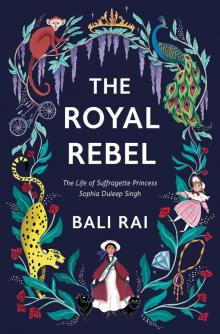 The Royal Rebel
The Royal Rebel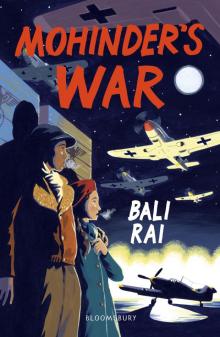 Mohinder's War
Mohinder's War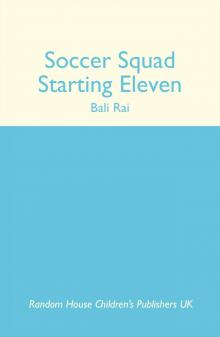 Starting Eleven
Starting Eleven Glory!
Glory! (Un)arranged Marriage
(Un)arranged Marriage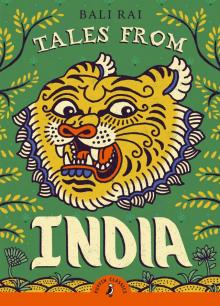 Tales from India
Tales from India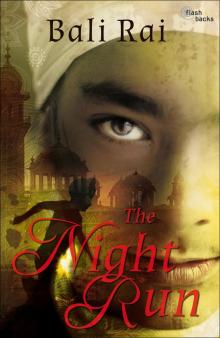 The Night Run
The Night Run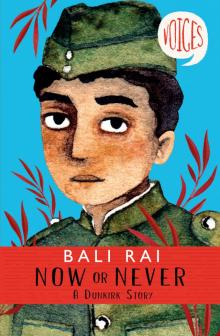 Voices: Now or Never
Voices: Now or Never Rani and Sukh
Rani and Sukh Stars!
Stars!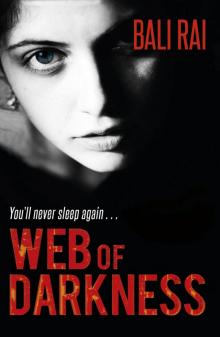 Web of Darkness
Web of Darkness The Crew
The Crew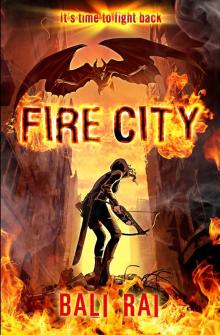 Fire City
Fire City The Last Taboo
The Last Taboo